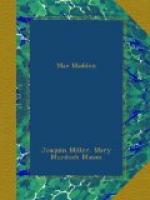There was a malicious sort of teasing pleasure in running away from Norman, mingled with a shrinking modesty; and, besides, he knew the way to the Capitol, if he chose to follow, and knew she was to be there alone. So, on the whole, Mae went off with a blissful heart.
As she sat down in that celebrated room, immortalized by the Gladiator, the Faun and the Antinous, scales seemed to fall from her eyes and a weight from her heart. Life meant something more than the mere play she delighted in, or the labor she despised. She took it in in this way. She realized, first of all, the enduringness of the marbles. They had stood, they will stand, for thousands of years. What have stood? What will stand? Idle blocks of stone, without form or meaning, or simply three beautiful shapes? No; three souls, thinks Mae, three real people, and she looks at the abiding faun, freedom and joy of the Satyr, the continual sentimental sadness of the Antinous, and the perpetual brave death-struggle of the Gladiator. They are living on now, and touching our hearts. Their mute lips open other eloquent mouths to speak for them. Hawthorne and Byron tell us what the Faun’s soul, what the Gladiator’s soul, look from the white marbles to us, and the world daily repeats the story the Antinous whispers in his bent, beautiful head, the vanitas vanitatum that our own hearts whisper, when we drop earnest life for voluptuous pleasures.
The Faun may smile, although life is only one long play-day in green fields and woods, because he is a Faun. The man must sigh, when he has drained his wine-cups and laughed his heartiest laugh, and wakes to another morning, because he is a man. The cry of humanity echoes in our souls. We cannot stifle it; we may hush it, and follow our idle joys, but the day comes when we bend our head with Antinous and Solomon and the rest of them, and sigh out our vanitas, vanitas also, in the great weary chorus.
No need, alas! for a Hawthorne, or Byron, or even a Shakspeare to interpret what the Antinous says for us. Our own hearts do it.
Mae caught the spirit of all this, as her eyes roamed out of the window on the Sabine hills, where woods and springs sang. She saw the aqueducts bounding, even in their ruin, arch after arch, to the treasure house of the waters. “They never can reach it, now,” thinks she, “never. Suppose they cannot, is not the spirit the same?” And now Mae is ready for the sudden light that dawns on her soul. She springs to her feet. She is alone in the room with the marble men; and they are quiet; even the Gladiator bites back his last groan once more.
“The Eternal City,” shouts Mae; “I know what it means at last. Oh! Rome, Rome, I love you!” and she rests her hand on the windowsill, and looks out on Rome. “Why, it is like a resurrection morn. Ruins? Yes, it is all ruins, dry bones, and great dead in dust; but there is something more. I only saw that graveyard part of it before; now, the spirit of the great men, and great deeds, and words, and thoughts, and prayers,” cries Mae, exultantly. “Why, they are here; not dead, like the rest, but alive, all around us. Oh! Rome, Rome, forgive me!”




